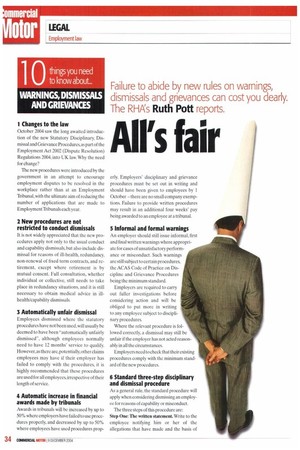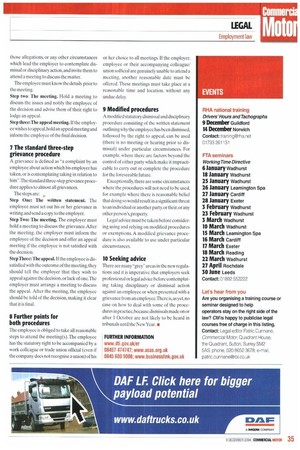All's fair
Page 34

Page 37

If you've noticed an error in this article please click here to report it so we can fix it.
Failure to abide by new rules on warnings, dismissals and grievances can cost you dearly.
The RHAs Ruth Pott reports.
I Changes to the law
October 2004 saw the long awaited introduction of the new Statutory Disciplinary, Dismissal and Grievance Procedures,as part of the Employment Act 2002 (Dispute Resolution) Regulations 2004, into UK law. Why the need for change?
The new procedures were introduced by the government in an attempt to encourage employment disputes to be resolved in the workplace rather than at an Employment Tribunal, with the ultimate aim of reducing the number of applications that are made to Employment Tribunals each year.
2 New procedures are not restricted to conduct dismissals
It is not widely appreciated that the new procedures apply not only to the usual conduct and capability dismissals, but also include dismissal for reasons of ill-health, redundancy, non-renewal of fixed term contracts, and retirement, except where retirement is by mutual consent. Full consultation, whether individual or collective, still needs to take place in redundancy situations, and it is still necessary to obtain medical advice in illhealth/capability dismissals.
3 Automatically unfair dismissal Employees dismissed where the statutory procedures have not been used, will usually be deemed to have been "automatically unfairly dismissed", although employees normally need to have 12 months' service to qualify. However,as there are, potentially,other claims employees may have if their employer has failed to comply with the procedures, it is highly recommended that these procedures are used for all employees, irrespective of their length of service.
4 Automatic increase in financial awards made by tribunals
Awards in tribunals will be increased by up to 50% where employers have failed to use procedures properly, and decreased by up to 50% where employees have used procedures prop erly. Employers' disciplinary and grievance procedures must be set out in writing and should have been given to employees by 1 October —there are no small company exemptions. Failure to provide written procedures may result in an additional four weeks' pay being awarded to an employee at a tribunal.
5 Informal and formal warnings An employer should still issue inlormal, first and final written warnings where appropriate for cases of unsatisfactory performance or misconduct. Such warnings are still subject to certain procedures, the ACAS Code of Practice on Discipline and Grievance Procedures being the minimum standard.
Employers are required to carry out fuller investigations before considering action and will be obliged to put more in writing to any employee subject to disciplinary procedures.
Where the relevant procedure is followed correctly, a dismissal may still be unfair if the employer has not acted reasonably in all the circumstances.
Employers need to check that their existing procedures comply with the minimum standard of the new procedures.
6 Standard three-step disciplinary and dismissal procedure
As a general rule, the standard procedure will apply when considering dismissing an employee for reasons of capability or misconduct.
The three steps of this procedure are: Step One: The written statement. Write to the employee notifying him or her of the allegations that have made and the basis of those allegations, or any other circumstances which lead the employer to contemplate dismissal or disciplinary action, and invite them to attend a meeting to discuss the matter.
The employee must know the details prior to the meeting.
Step two: The meeting. Hold a meeting to discuss the issues and notify the employee of the decision and advise them of their right to lodge an appeal. Step three: The appeal meeting. If the employee wishes to appeal, hold an appeal meeting and inform the employee of the final decision.
7 The standard three-step grievance procedure
A grievance is defined as "a complaint by an employee about action which his employer has taken, or is contemplating taking in relation to h im"lhe standard three-step grievance procedure applies to almost all grievances.
The steps are: Step One: The written statement. The employee must set out his or her grievance in writing and send a copy to the employer.
Step Two: The meeting. The employer must hold a meeting to discuss the grievance. After the meeting. the employer must inform the employee of the decision and offer an appeal meeting if the employee is not satisfied with the decision.
Step Three: The appeal. If the employee is dissatisfied with the outcome of the meeting, they should tell the employer that they wish to appeal against the decision, or lack of one.The employer must arrange a meeting to discuss the appeal. After the meeting, the employee should be told of the decision, making it clear that it is final.
8 Further points for both procedures
The employee is obliged to take all reasonable steps to attend the meeting(s). The employee has the statutory right to be accompanied by a work colleague or trade union official (even if the company does not recognise a union) of his or her choice to all meetings. If the employer. employee or their accompanying colleague/ union sofficial are genuinely unable to attend a meeting, another reasonable date must be offered. These meetings must take place at a reasonable time and location, without any undue delay.
9 Modified procedures
A modified statutory dismissal and disciplinary procedure consisting of the written statement outlining why the employee has been dismissed, followed by the right to appeal, can be used (there is no meeting or hearing prior to dismissal) under particular circumstances. For example, where there are factors beyond the control of either party which make it impracticable to carry out or complete the procedure for the foreseeable future.
Exceptionally, there are some circumstances where the procedures will not need Lobe used, for example where there is reasonable belief that doing so would result in a significant threat loan individual or another party. or their. or any other person's, property.
Legal advice must be taken before considering using and relying on modified procedures or exemptions. A modified grievance procedure is also available to use under particular circumstances.
10 Seeking advice
There are many "grey" areas in the new regulations and it is imperative that employers seek professional or legal advice before contemplating taking disciplinary or dismissal action against an employee or when presented with a grievance from an employee.There is, as yet, no case on how to deal with some of the procedures in practice, because dismissals made on or after 1 October are not likely to be heard in tribunals until the New Year. •


























































































































































































